Table of Contents
Organometallic Chemistry
Coordination Chemistry Fundamentals Series
Series editors:
Makoto Fujita, The University of Tokyo, Japan
Naohito Ishikawa, Osaka University, Japan
Osamu Ishitani, Tokyo Institute of Technology, Japan
Hideki Masuda, Nagoya Institute of Technology, Japan and Aichi Institute of Technology, Japan
Hiroshi Nakazawa, Osaka City University, Japan
Hiroki Oshio, The University of Tsukuba, Japan
Toshio Yamaguchi, Fukuoka University, Japan
Titles in the series:
1: Organometallic Chemistry
How to obtain future titles on publication:
A standing order plan is available for this series. A standing order will bring delivery of each new volume immediately on publication.
For further information please contact:
Book Sales Department, Royal Society of Chemistry, Thomas Graham House, Science Park, Milton Road, Cambridge, CB4 0WF, UK
Telephone: +44 (0)1223 420066, Fax: +44 (0)1223 420247
Email:
Visit our website at www.rsc.org/books
Organometallic Chemistry
Edited by
Hiroshi Nakazawa
Osaka City University, Japan
Email:
and
Julian Koe
International Christian University, Japan
Email:

Coordination Chemistry Fundamentals Series No. 1
Print ISBN: 978-1-83916-406-4
PDF ISBN: 978-1-83916-420-0
EPUB ISBN: 978-1-83916-421-7
Print ISSN: 2635-1498
Electronic ISSN: 2635-1501
A catalogue record for this book is available from the British Library
Japan Society of Coordination Chemistry 2021
All rights reserved
Translation from the Japanese language edition:
Organometallic Chemistry, edited by Hiroshi Nakazawa. ISBN: 978-4-7827-0707-4
Copyright 2010 Japan Society of Coordination Chemistry
All Rights Reserved
Apart from fair dealing for the purposes of research for non-commercial purposes or for private study, criticism or review, as permitted under the Copyright, Designs and Patents Act 1988 and the Copyright and Related Rights Regulations 2003, this publication may not be reproduced, stored or transmitted, in any form or by any means, without the prior permission in writing of The Royal Society of Chemistry or the copyright owner, or in the case of reproduction in accordance with the terms of licences issued by the Copyright Licensing Agency in the UK, or in accordance with the terms of the licences issued by the appropriate Reproduction Rights Organization outside the UK. Enquiries concerning reproduction outside the terms stated here should be sent to The Royal Society of Chemistry at the address printed on this page.
Whilst this material has been produced with all due care, The Royal Society of Chemistry cannot be held responsible or liable for its accuracy and completeness, nor for any consequences arising from any errors or the use of the information contained in this publication. The publication of advertisements does not constitute any endorsement by The Royal Society of Chemistry or Authors of any products advertised. The views and opinions advanced by contributors do not necessarily reflect those of The Royal Society of Chemistry which shall not be liable for any resulting loss or damage arising as a result of reliance upon this material.
The Royal Society of Chemistry is a charity, registered in England and Wales, Number 207890, and a company incorporated in England by Royal Charter (Registered No. RC000524), registered office: Burlington House, Piccadilly, London W1J 0BA, UK, Telephone: +44 (0) 20 7437 8656.
For further information see our website at www.rsc.org
Printed in the United Kingdom by CPI Group (UK) Ltd, Croydon, CR0 4YY, UK
Contents
Hiroshi Nakazawa
Hiroshi Nakazawa
Hiroshi Nakazawa
Hiroshi Nakazawa
Hiroshi Nakazawa
Hiroshi Nakazawa
Hiroshi Nakazawa
Hiroshi Nakazawa
Yasuro Kawano and Keiji Ueno
Hiroyuki Matsuzaka and Tsutomu Mizuta
Kohtaro Osakada
Kohtaro Osakada
Hiroshi Nakazawa
Preface
This book is intended for use by middle to final year chemistry students in undergraduate courses in organometallic chemistry. It is based on the book written in Japanese named  (Yuki-kinzoku kagaku = Organometallic Chemistry), one of a series of works on coordination chemistry organized by the Japan Society of Coordination Chemistry. The Japanese language version of the book has been used as a textbook of organometallic chemistry in Japan since 2010 and has a good reputation. It has now been decided that the Royal Society of Chemistry will publish several books from this series in English, and this book is the first in the series.
(Yuki-kinzoku kagaku = Organometallic Chemistry), one of a series of works on coordination chemistry organized by the Japan Society of Coordination Chemistry. The Japanese language version of the book has been used as a textbook of organometallic chemistry in Japan since 2010 and has a good reputation. It has now been decided that the Royal Society of Chemistry will publish several books from this series in English, and this book is the first in the series.
The book consists of two sections; Section 1: Basics and Section 2: Advanced. The former covers fundamental aspects of organometallic chemistry, preparing readers for understanding the more advanced topics in the latter. Readers will thus grasp both the basics and the cutting edge of the field. In the basic part, the fundamental reaction patterns concerning bonds between transition metals and carbon atoms are described, including also how these are combined to establish effective catalytic cycles. To understand the basics and make use of the knowledge, it is most effective to solve problems, so the book contains a number of practice questions and gives appropriate answers to deepen the reader's understanding. In the advanced part, the chemistry concerning bonding between transition metals and main group elements other than C, such as MSi, MN, MP, MO and MS covalent bonds is described and the origin of the differences to the MC case is discussed. Since there are few textbooks that systematically describe the bonding between transition metals and main group elements other than C, this book is both unique and useful in this respect.
Chapters 1 to 7 of Section 1 and Chapter 13 (solutions to problems) were prepared by H. Nakazawa. In Section 2, the contributors were Chapter 8: M. Okazaki, Chapter 9: Y. Kawano and K. Ueno, Chapter 10: H. Matsuzaka and T. Mizuta, and Chapters 11 and 12: K. Osakada. H. Nakazawa edited the book and Julian Koe edited the work with regard to the English. The authors would like to thank the many people who have contributed to the preparation of the book.
Hiroshi Nakazawa
Osaka, Japan
Author Biography
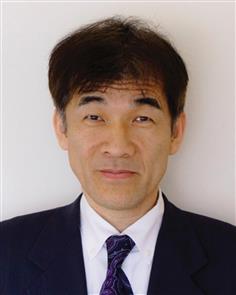
Yasuro Kawano was born in Sapporo city. He received his PhD degree in 1993 from Tohoku University. Since 1994, he has pursued his career as an assistant professor and an associate professor at the University of Tokyo. His research field is coordination chemistry, in particular, siliconmetal chemistry and boronmetal chemistry. At present, he works as a lecturer at several universities.
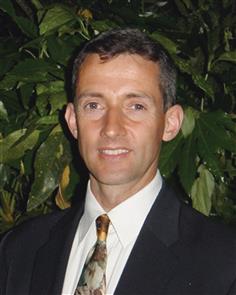

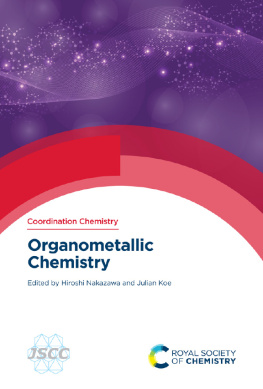
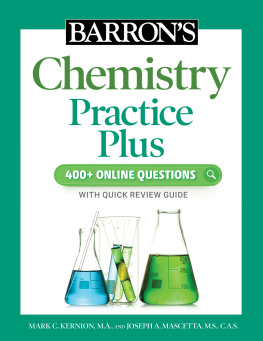
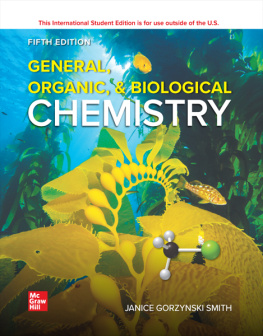

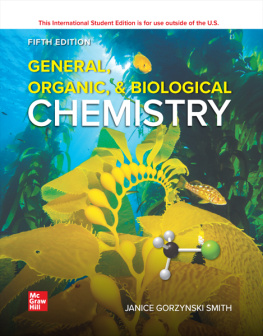
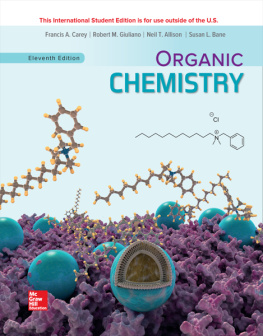
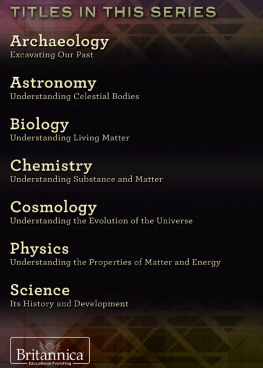
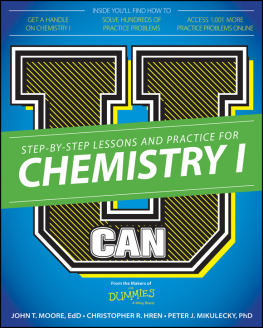

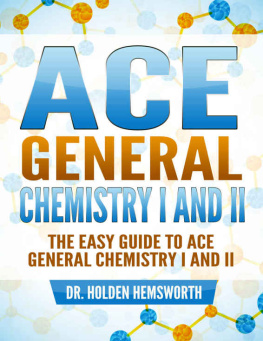
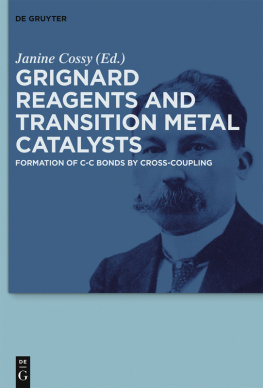


 (Yuki-kinzoku kagaku = Organometallic Chemistry), one of a series of works on coordination chemistry organized by the Japan Society of Coordination Chemistry. The Japanese language version of the book has been used as a textbook of organometallic chemistry in Japan since 2010 and has a good reputation. It has now been decided that the Royal Society of Chemistry will publish several books from this series in English, and this book is the first in the series.
(Yuki-kinzoku kagaku = Organometallic Chemistry), one of a series of works on coordination chemistry organized by the Japan Society of Coordination Chemistry. The Japanese language version of the book has been used as a textbook of organometallic chemistry in Japan since 2010 and has a good reputation. It has now been decided that the Royal Society of Chemistry will publish several books from this series in English, and this book is the first in the series.
